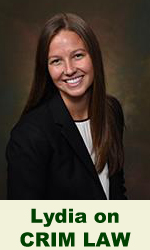Criminal Law Study Aids
 by Lydia Warkentin, 1L
by Lydia Warkentin, 1L
CALI: Computer Assisted Learning Instruction
httpa://www.cali.org/
(Requires access code)
No need to worry about lugging around a huge book! An online resource, CALI is very helpful for all subjects, not just criminal law. There are over 50 lessons in criminal law, ranging in topic from "Actus Reus," to "Plea and Discovery." The lessons, created by law professors from around the country, quiz you and keep track of right and wrong answers as you go. Something about seeing your score makes this method feel more official, and may motivate you to work harder, than simply answering in a workbook. Most of the questions are yes/no or multiple choice, though many lessons give options to write an essay at the end.
Inside Criminal Law: What Matters and Why (2nd ed.)
John M. Burkoff and Russell L. Weaver
KF9219 .B83 2011
Inside Series
Providing only broad overviews of key topics in criminal law, this book will be helpful to students struggling to grasp the basic rules, or those who would like a general review before diving into the trickier complexities of criminal law. The book is not structured like an outline, and for some students the long paragraphs (like a textbook) may be intimidating. However, the chapters flow nicely and the book is well-written. The questions interspersed within the chapters help to draw the reader back to the most important, yet primitive, rules.
Mastering Criminal Law (2nd ed.)
Ellen S. Podgor, Peter J. Henning, and Neil P. Cohen
KF9219 .P63 2015
Mastering Series
Mastering is in the title for a reason. This book covers many topics not covered in class, and therefore, many topics that will (hopefully) not be covered on the final. For example, this book has a section on halfway houses as alternative methods of punishment. Probably not relevant to my crim final, hopefully not to yours either. However, some sections, such as the section on felony murder, are very relevant and useful, especially when studying the bigger issues that we may expect to be tested on in December. If you have specific questions about a specific topic, the answers very well might be in this book. (No questions, so don’t open this book expecting to find hypos.)
Criminal Law (4th ed.)
Steven L. Emanuel
KF9219.3 .E44 2010
CrunchTime Series
Unique to this book are comprehensive flow charts that take the reader through potential scenarios of homicide, actus reus, mens rea, etc. This book is formatted like an outline making it easy to read and understand. At the end of the book, there are essay questions with long fact patterns, good for preparing for an exam.
Criminal Law (19th ed.)
George E. Dix
KF9219.3 .R88 2016 (and online)
Gilbert Law Summaries
Formatted like an outline, this book could probably help many students format and finalize theirs. Each chapter begins with a section titled, "Key Exam Issues." This is useful for those of us wondering what types of questions may appear on a final and give you, as the reader, questions to keep in the back of your mind as you complete the remainder of the chapter. The book is also scattered with "exam tips."
Acing Criminal Law (3rd ed.)
John M. Burkoff
KF9219.85 .B87 2017 (and online)
Acing Series
For those who are worried about spotting all of the issues on the exam, this book is for you. This book breaks down every topic we have discussed into a checklist of things you won't want to miss on the final. For example, the checklist for mens rea includes the MPC tests, specific and general intent, and strict liability, among other things. After the checklist, there is a problem, followed immediately by an in-depth, yet clear, answer. Great practice for short answer questions.
The Glannon Guide to Criminal Law (4th ed.)
Laurie Levenson
KF9219.85 .L477 2015
Glannon Guides
Assuming that your crim exam, like mine, is not multiple-choice, this book may not be the most useful. Brief descriptions of the rule are immediately followed by related questions, which is nice because you can test yourself to see if you actually understood what you just read. If you are having trouble keeping majority, modern trend, and MPC straight, this book does a good job of testing and reinforcing the different approaches of each.
Questions & Answers: Criminal Law (4th ed.)
Paul Marcus and Emily Marcus Levine
KF9219.85 .L48 2018
Questions and Answers Series
With over 150 multiple-choice and short answer questions, as well as a practice final exam, this book provides in depth and clear answers that help students to make sense of even the most challenging parts of criminal law. The questions are grouped by topic so students can focus on the areas where they need the most work.
Criminal Law: Examples & Explanations (7th ed.)
Richard G. Singer and John Q. La Fond
KF9219.85 .S58 2018
Examples & Explanations Series
Ever sit down to take a midterm thinking you're super prepared and then you read the first problem and realize you're not? This book, full of hypos, will prepare you for tough question written to stump you. Since the hypos are tricky, they are entertaining to read, almost making studying fun! I found the section on attempt to be particularly helpful.